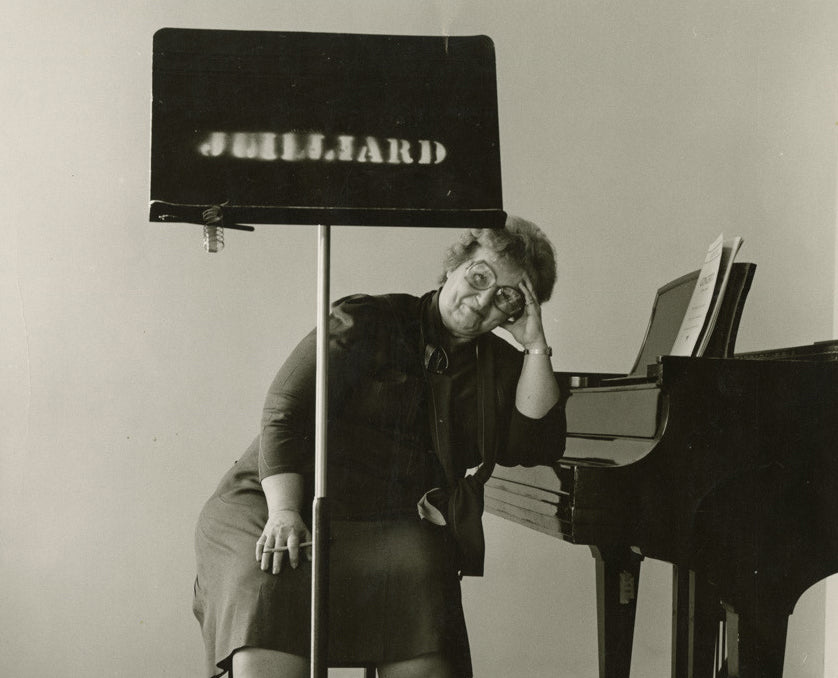
Dorothy DeLay was born in Kansas on March 31st, 1917. At age 4, she began playing the violin, which was a passion she would pursue for the next 80 years. Dorothy DeLay attended Michigan State University, Oberlin Conservatory, and the Juilliard School. In 1948, DeLay became the assistant of Ivan Galamian at the Juilliard School. Over the course of her career, she notably taught at the Juilliard School, Sarah Lawrence College, New England Conservatory, University of Cincinnati-College-Conservatory of Music, and Aspen Music Festival.
DeLay was an incredibly successful student, and graduated high school at age 14. However, she grew up at a time when asking questions and prompting conversation was seen as questioning the teacher's knowledge, and was incredibly disrespectful. DeLay thought this approach was very ineffective, and vowed to create an environment where students could explore their creativity, and felt safe to ask questions.
Dorothy DeLay taught many of the 20th and 21st century violin virtuoso, including Nadja Salerno-Sonnenberg, Itzhak Perlman, Midori, Nigel Kennedy, and Sarah Chang. Her students hold seats in renowned orchestras around the world, are famous soloists, and are sought after teachers themselves. Although Ms. DeLay unfortunately passed away from cancer in 2002, age 84, the music world still feels the great effects of this incredibly influential woman.
What Made DeLay’s Teaching Approach Unique?
Dorothy DeLay was an incredibly understanding and compassionate instructor. In the 20th century, many instructors followed an old-world approach to teaching. In an old-world method, teachers were demanding, stern, and would expect nothing short of excellence from their students. This approach brought wondrous results, but DeLay preferred a different method. While DeLay also expected excellence from her students, and had all her students follow her rigorous daily practice regimen, she believed in fostering creativity. Dorothy DeLay’s daily practice regimen consisted of 5 hours of work. All of the hours were broken down into 50 minutes of practice followed by a ten-minute break. The first hour of practice would be spent on the basics, such as longbows, vibrato work, and shifting exercises. The second hour would be spent on arpeggios, scales and passage work. Any difficult passages in the student repertoire would be practiced during this hour. The third hour would be spent on Etudes and Paganini. After this, the student would work one hour on concertos. The final hour would be spent on Bach, and any other repertoire that was being prepared. Dorothy DeLay taught a large number of young students, so having a defined, structured layout of practice greatly benefited her rising stars.
Dorothy DeLay was also very affectionate and caring for her students on a personal level. DeLay often used pet names, such as ‘sugar plum’ and ‘sweetie’. She even drove some of her students home after late night lessons. She made the time to know her students on a personal level. Her approach was very different than that of her predecessors. However, even though DeLay’s nurturing and caring methods help develop a very special relationship with her students, she still expected them to work hard and to be great. She was very powerful! Oftentimes, DeLay would introduce her students to famous conductors and world class musicians to ensure they were properly networking and were building a foundation for their future careers as soloists. For half a century, DeLay dominated the world of violin education, and provided lasting reforms to teaching music at the collegiate level. Students came from all over the world hoping to study with Dorothy DeLay and achieve virtuosity.
Maintaining a Legacy
The name ‘DeLay’ is still incredibly common in music circles. Every other year, the Juilliard school hosts the Starling-DeLay symposium in honor of their late faculty member. This event includes master classes, teaching workshops, and distinguished faculty recitals and was last held in May of 2023. It included classes on body mapping, resilience, and inclusion of blues in classical music. In addition to a stellar roster of recital performers, former DeLay student Itzhak Perlman hosted a Q&A session. With the maintenance of programs such as the Starling-DeLay Symposium, Dorothy DeLay continues to educate and change the lives of young musicians.
Article written by Erica Garcia



Leave a comment